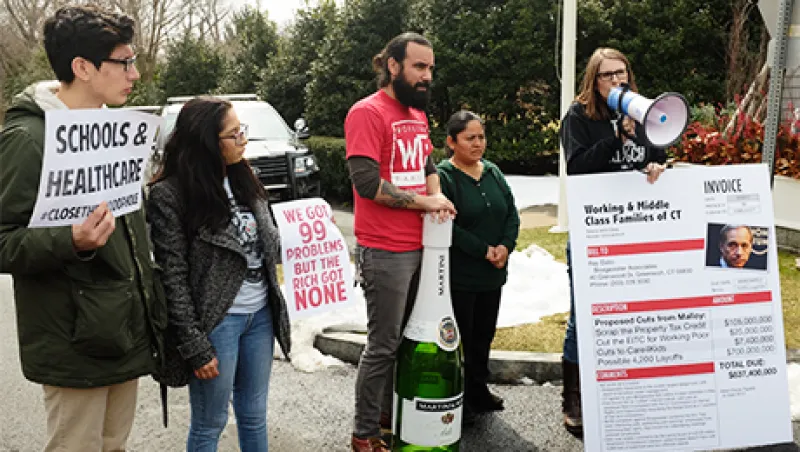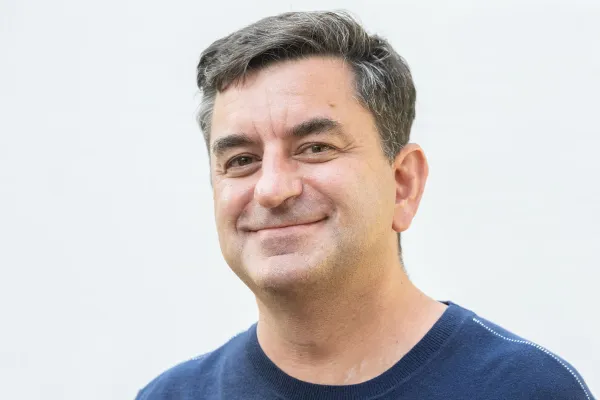Hedge fund managers be warned: The masses are coming for you, and they are angry.
At a time of rising populism and increasing income inequality, with state governments and local municipalities strapped for cash and making cuts to essential goods and services, the ultrarich — a class that includes many hedge fund and private equity managers as well as banking executives — have become an increasingly prominent target for unrest. This past weekend activists took to the leafy streets of Greenwich, Connecticut, and the surrounding towns to highlight the growing inequality in that state and to call for tax reforms that would make the wealthiest 1 percent of the state’s population pay more into state and federal coffers.
The “Lifestyles of the Rich & Shameless” bus tour was organized by a number of union-backed community groups, including the Connecticut Working Families Party. Dominic Rushe, a journalist for the Guardian, went along for the ride, reporting that the activists made stops to protest at, among other spots, the homes of Point72 Asset Management founder Steven Cohen and Ray Dalio, the founder of Bridgewater Associates.
Dalio is well aware of the growing populist sentiment in America and what that might mean not just for capitalists like himself but also for capital markets in general. Just last Wednesday the Bridgewater founder, who announced in February that he is stepping back from day-to-day firm management responsibilities when he relinquishes his co-CEO role effective April 15, published a 61-page research paper on the emergence of populism — a phenomenon most clearly manifested in the developed-market countries in the shock election last November of U.S. President Donald Trump.
“Populism is not well understood because, over the past several decades, it has been infrequent in emerging countries ... and virtually nonexistent in developed countries,” Dalio writes in the paper, which he coauthored. “It is one of those phenomena that comes along in a big way about once a lifetime — like pandemics, depressions, or wars. The last time that it existed as a major force in the world was in the 1930s, when most countries became populist. Over the last year, it has again emerged as a major force.”
Dalio says populism today is less rigidly ideological than it was in the 1930s, though it is gaining power rapidly. “Given the extent of it now, over the next year populism will certainly play a greater role in shaping economic policies,” the hedge fund manager writes. “In fact, we believe that populism’s role in shaping economic conditions will probably be more powerful than classic monetary and fiscal policies (as well as a big influence on fiscal policies).” It will also have important international implications — especially given that the new populism is not solely a U.S. phenomenon, but is playing out across the U.K. and the rest of Europe as well.
Just how important the new populism will be, Dalio says, “we can’t yet say. We will learn a lot more over the next year or so as those populists now in office will signal how classically populist they will be and a number of elections will determine how many more populists enter office.”
What is clear is that the groups protesting at the entrance to Dalio’s property this weekend are a very tangible manifestation of the new form of American populism, one that crosses political divides and confounds political analysts. Just one day before the protest in Greenwich, the House Freedom Caucus in Washington — a group made up of far-right Republican members of the U.S. House of Representatives, most of whom were elected as part of the so-called Tea Party movement — had succeeded in stymieing President Trump’s efforts to repeal his predecessor’s health care law.
Whereas Connecticut is home to some of the world’s wealthiest hedge fund managers, the state as a whole also has pockets of extreme poverty, and its finances are in such poor shape that the second-term Governor Dannel Malloy has called for significant cuts, including the restructuring of municipal aid.
The union groups that organized the “Lifestyles of the Rich & Shameless” tour would like to see the in-state hedge fund mangers pay more in taxes. In particular, they are supportive of a bill before the Connecticut state legislature, HB 6973, which would require investment managers to pay a local surcharge on their tax bill. (Similar bills are being put before lawmakers in New York, New Jersey, and Massachusetts to ensure that hedge fund managers do not just up and leave the state for a more favorable jurisdiction nearby.) The Connecticut bill is expected to get a hearing in mid-April.






